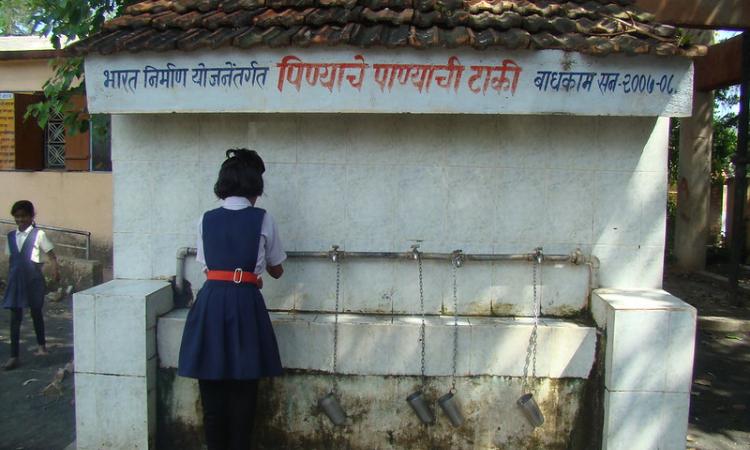
Telangana joins a group of states which have ensured tap water supply to schools, anganwadis
The state which was the first in the country to provide tap water connections to 100 percent households has added another feather in its cap by achieving tap water connections to all schools and anganwadi centres (AWCs) spread across the state.
Works on providing tap water connections to schools, anganwadi centres and ashramshalas was taken up under the 100-day special campaign of the Ministry of Jal Shakti under the Jal Jeevan Mission. The other states which have reported the provision of tap water in all schools and AWCs are Andhra Pradesh, Himachal Pradesh, Goa, Haryana and Tamil Nadu. (The Hindu)
First-of-its-kind solar-based water supply project set up in Punjab
Punjab's water supply and sanitation department has set up a first-of-its-kind solar-based water supply project at Jagrawan-Muradpur and Talwara villages of the Jalandhar district. The solar-based pilot projects that were commissioned at a cost of Rs 67.71 lakh have benefited the panchayats of these villages as they no more have to pay electricity bills for water supply projects. Besides this, 150-metre deep tubewells have also been installed along with the construction of 25,000 litre capacity water tanks that will provide piped water supply to every household in these villages. (Republic World)
Uttarakhand disaster: Lake opening widened and first early warning system installed
Amid apprehensions about another deluge, the Uttarakhand State Disaster Response Force (SDRF) has widened the opening of the lake formed upstream of the Rishi Ganga river in Chamoli district following the flash floods. The lake has been widened from 20 feet to 35 feet to increase the outflow of water and reduce pressure on the lake walls. Along with this, the SDRF has set up a siren-based early warning water-level sensor system at Reni, the most affected village in Chamoli. The siren will be sounded and villagers will be alerted downstream to move away from the river, in case the water level in the Rishiganga river rises by a few feet. (The Indian Express, Hindustan Times)
Frequency of flash drought to increase in the country, thanks to climate change: Study
According to a study by researchers at the Indian Institute of Technology (IIT) Gandhinagar, climate change will increase the frequency of flash droughts in India in the future, which will have a negative impact on crop production, irrigation demands, and groundwater abstraction. The study which used soil moisture simulations, observations from India Meteorological Department (IMD), and climate projections, examined the role of human-caused climate warming and intra-seasonal variability during the summer monsoon season on the flash drought occurrence over India.
The study found that the flash droughts in India are caused by the monsoon breaks or delayed monsoon coupled with the increased air temperatures owing to climate change, both of which can exacerbate the flash drought occurrence in India.
(Business Standard)
CSE’s environment report observes that 375 million kids to suffer long-lasting effects of the pandemic
As per the State of Environment Report, 2021 by the Center for Science and Environment (CSE), nearly 375 million children in the country are likely to suffer long-lasting impacts owing to the coronavirus pandemic.
These impacts range from being underweight, stunting and increased child mortality, to losses in education and work productivity. Further, the report informed that over 500 million children were forced out of school globally and India accounted for more than half of them.
The report also pointed to a lack of action over the years to control and reduce pollution even in areas that were already identified as ‘critically’ or ‘severely’ polluted. (The Hindu)
This is a roundup of important news published from February 15 - 28, 2021. Also, read policy matters this week.
/articles/telangana-among-states-ensuring-tap-water-supply-schools-anganwadis